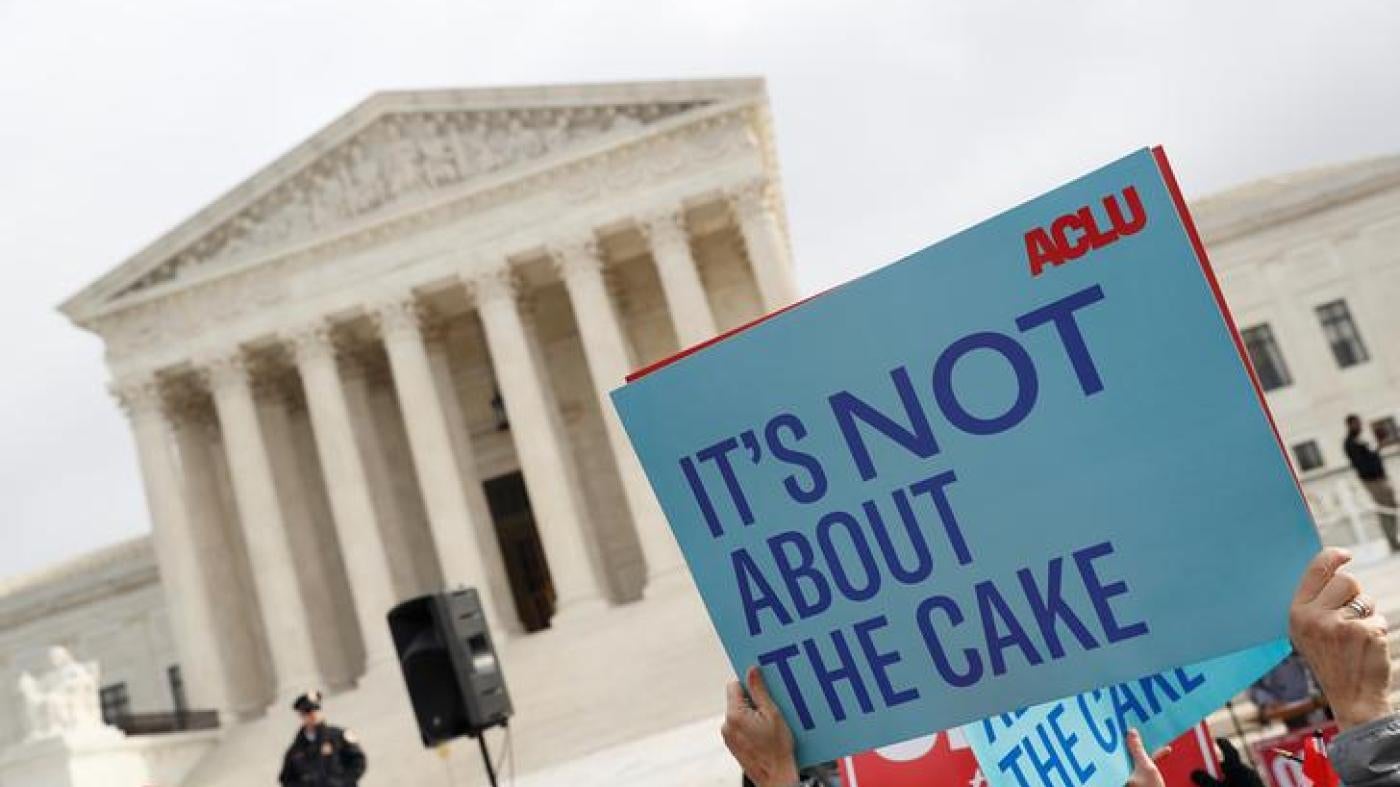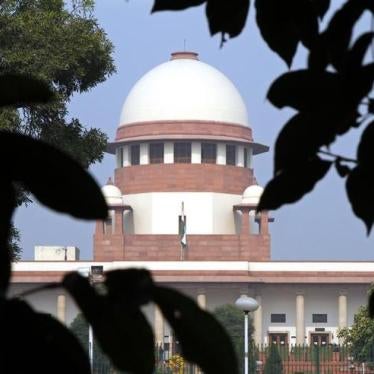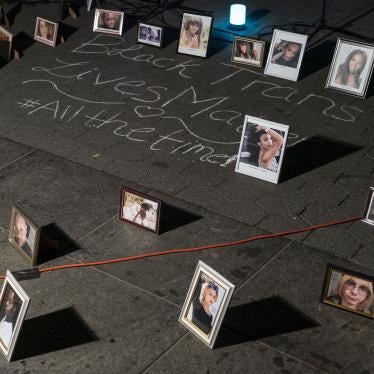Aren’t these laws just designed to protect religious freedom in the US?
Religious freedom is an important value, but these laws don’t respond to any real-world threat to religious freedom and are more about legitimizing discrimination. The debates around these laws are a direct response to same-sex marriage being recognized across the US, and a concern that people who want to discriminate against LGBT people won’t be able to do that if LGBT people are protected.
After 2015, when the right for same-sex couples to marry in the US was established, we saw this big wave of bills at the state level that sought to carve out exemptions for people who didn’t want to work with same-sex couples. These bills allowed, for example, wedding service providers, adoption and foster care agencies, and in some cases even counselors and mental and physical healthcare providers to refuse to serve LGBT people.
Resistance to LGBT equality is the primary motivation for these laws, not a concern for religious freedom. Just look at some of the laws. In Mississippi, the law protects the belief that marriage is between a man and woman, that sex outside that marriage in any form is unacceptable, and that gender identity is immutable and fixed at birth. That’s not a protection of religious freedom, that’s a protection of one particular type of religious viewpoint.
What do the laws say?
Tennessee has a law that allows mental health counsellors to decline to see LGBT clients based on the counselors’ religious beliefs. Seven states – Mississippi, Michigan, Virginia, North Dakota, South Dakota, Alabama, and Texas – have laws that specifically allow child welfare agencies to discriminate against same-sex couples in adoption and foster care placements.
Often these are described as religious exemption laws, but in reality these aren’t true exemptions. None of these states have non-discrimination laws in place to protect LGBT people, so really these just function as a license to discriminate.
Is this just a case of private businesses being given the option of turning away customers, or does it go further?
Most of these laws extend a kind of blanket exemption to agencies that receive state funding, so adoption and foster care agencies that have contracts with the state and have kids in state custody in their care are allowed to deny placements to same-sex couples because they don’t agree with same-sex relationships.
Taxpayer money and resources go to these agencies that are allowed to discriminate, and these laws explicitly bar the state from withholding any of that support from an organization that discriminates.
Can you talk a bit more about the adoption and foster care system, and the impact these laws have?
One of the stories that really stands out to me is of a Tennessee couple I spoke with who are finalizing an adoption. They had been living in Texas and wanted to start a family, so they went to an adoption agency and were rejected right off the bat because the agency didn’t deal with same-sex couples. They then went to a second agency, which did a home visit, but because one of the men had a gender-neutral name the agency didn’t realize it was a same sex couple. When the agency representative showed up, they said, “We didn’t realize you were a same sex couple” and left after about five minutes.
They couple then moved to Tennessee for work. The first agency they spoke to there wouldn’t place a male child with them because they didn’t think the couple provided enough masculinity for a male child. It wasn’t until the fourth agency that they were able to take on foster placements. The placement has been extremely successful and now they are in the process of adopting two boys they fostered.
What really stuck with me from our interview is that they said that if this fourth agency hadn’t worked out, they were at the point of calling it quits. You can only be rejected so many times before it becomes a really discouraging experience and you give up your dream of being parents.
How else are these laws affecting people’s lives?
First, you see people who are actually turned away from mental health services under these exemptions. That’s an immediate kind of refusal that is likely to happen even more often as a result of these laws.
One thing that comes up is that a lot of LGBT people just don’t seek mental health services because they don’t know where to find providers who won’t discriminate against them. We spoke with a number of therapists in Tennessee who said clients would come to them in crisis mode. They should have seen a therapist a long time ago, but had had such bad experiences with healthcare providers, or expected to face discrimination because of the law, and just hadn’t sought out the services that they needed. We spoke to therapists who were welcoming and affirming, and who had people driving for one or two hours just for weekly therapy sessions.
The third thing that has come out of the interviews is the harm to people’s dignity. As one lesbian woman in Mississippi told me, “You’re being treated with disrespect, as a second-class citizen – not even a citizen, an outsider.”
There are some big stories about this that have made headlines, but is there more happening?
One of the things I’ve learned from interviewing LGBT people is just how often they are discriminated against by healthcare providers or businesses in the US. It really illustrates that these laws fall on very fertile ground for further discrimination – they’re essentially telling providers they’ve got a green light from the state to discriminate against people.
Can you give me some specific examples?
Someone who in the report we called Kevin R., who is in his mid 50s and had been putting off the colonoscopy he was supposed to get.
He finally went, and he mentioned that his spouse was a man, and the doctor from then on used female pronouns for him even though he’s a cisgender man. The doctor used female pronouns for him all the way through and mocked him throughout the process. It confirmed his worst suspicions about how he’d be treated at the hands of a healthcare provider. That’s the kind of discrimination that deters people from seeking services in the first place and that these laws can tacitly encourage.
One transgender woman had been seeing a therapist for bipolar disorder and depression. The therapist was going to be away for the weekend and told her, "If you have a moment of crisis, go to the emergency room.” She did have a moment of crisis, went to the emergency room, and was essentially told by the therapist on staff that her distress was because she was a man living as a woman and going against God.
You wonder how many of those kinds of instances happen all the time and how often religious bias is already used to deter people from services, and then what it means to pass laws like this that really put LGBT people at risk.
What can people do?
One thing people can do is really push for robust non-discrimination policies in their states. Those policies are supported by a majority of the public in every state.
One of the things I was reminded of from the interviews is that LGBT people have often faced intense discrimination from the faith communities and churches they grew up in. Historically some faith communities have been active in anti-LGBT efforts or have struggled with including LGBT people within their own denominations.
People I spoke with mentioned that if you go to a doctor’s office that identifies itself as a Christian provider, or has overtly religious imagery on the walls, LGBT people will worry the provider is not LGBT-friendly. Something providers can voluntarily do is be welcoming. For example, a doctor who is religious, but also committed to doing no harm and to serving everyone, can make their office an LGBT-affirming space. It can be really important to place signals that they are open for all clients.
This interview has been edited and condensed.





